By Mary L. Walshok
[8 minute read]

Recently, I was in a board meeting with some of our regional tech executives at which each of us was invited to comment on "What was the best thing that happened to us in this, possibly the worst year of our lives?"
It turned out to be an inspiring and informative exchange. Each of us shared that a.) We had never worked so hard in our lives but… b.) All the effort had paid off, and we had achieved things we would not have imagined possible, all while working out of home offices rather than participating in-person at board meetings, planning meetings, traveling around the city, the state and the world for that matter.
And importantly, c.) Everyone commented on the extent to which being forced to be home introduced them to new ways of achieving a work-life balance that they might not otherwise have found.
Crying babies, barking dogs, interruptions by eight-year-olds in the middle of a zoom meeting are things we've learned to integrate into our daily work lives.
And, d.) There is a level of acceptance of the need to attend to family and domestic issues simultaneous with work issues that was not as present in most of our lives before COVID-19 forced us to alter normal operating procedures in order to keep this deadly virus from wreaking even more havoc than it has.
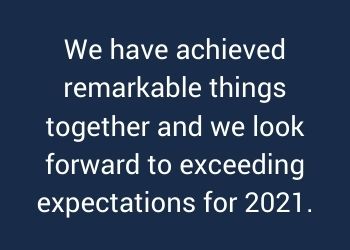 I hope the personal experience of the last nine months of isolation and home-based work has brought with it some benefits to each and every one of you in terms of work-life balance. I can tell you for sure that Extension has succeeded in functioning at the highest levels in these difficult times because of our drive to provide the necessary training, skills, educational tools and entertainment distractions for a world radically changed by stay-at-home mandates.
I hope the personal experience of the last nine months of isolation and home-based work has brought with it some benefits to each and every one of you in terms of work-life balance. I can tell you for sure that Extension has succeeded in functioning at the highest levels in these difficult times because of our drive to provide the necessary training, skills, educational tools and entertainment distractions for a world radically changed by stay-at-home mandates.
In all areas, we are performing as well as when we commuted into the office every day, and in many places, we are actually outperforming our office-base.
We have achieved remarkable things together and we look forward to exceeding those expectations for 2021.
You will see in the following list of our top 20 accomplishments this past year a wonderful array of developments. Additionally, a number of us have been recognized and honored for our leadership contributions over the last year. And, a number of NEW initiatives have seen the light of day in spite of relying exclusively on remote connections and technologies.
I hope you are as excited about our top 20 list this year as I am. Thank you for investing in yourselves by allowing us to provide educational and recreational opportunities for you and your family.
During possibly one of the worst years of many of our lifetimes, we are thankful that you remained a part of our Extension family, and we look forward to helping you continue striving toward your next goal as you explore the full potential of 2021.
Top 20 Highlights of 2020
1. Extension's Education & Community Outreach (ECO) division successfully created and adapted an advanced online teaching and education credential program for California educators into a rigorous and timely, virtual learning experience. Thanks to financial support from the Girard Foundation, more than 5,500 teachers and parents have enrolled in the course over a six-month period.
 2. UCSD-TV curated a special collection of material related to the pandemic designed both as diversion and information. Of the many options, UC San Diego researchers offered a panel discussion on COVID-19 and the nature of viruses. Moderated by former Executive Vice Chancellor Suresh Subramani, "A Deep Look into the Biology and Evolution of COVID-19" aired in June and to-date has attracted more than 780,000 viewers.
2. UCSD-TV curated a special collection of material related to the pandemic designed both as diversion and information. Of the many options, UC San Diego researchers offered a panel discussion on COVID-19 and the nature of viruses. Moderated by former Executive Vice Chancellor Suresh Subramani, "A Deep Look into the Biology and Evolution of COVID-19" aired in June and to-date has attracted more than 780,000 viewers.
3. The establishment of Extension's Inclusive Excellence Advisory Council focused on promoting excellence and equity. A passionate cross-section of employees have agreed to offer constructive criticism on ways in which we, as an academic unit of UC San Diego, can assure equity, diversity and inclusion within our organization in our daily practices, as well as for our students and instructors.
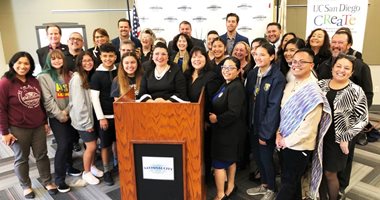 4. Unanimously approved by the City Council of National City, UCSD and Extension officials signed a letter of intent to build an educational campus in the South San Diego municipality to be run by UC San Diego Extension's ECO team.
4. Unanimously approved by the City Council of National City, UCSD and Extension officials signed a letter of intent to build an educational campus in the South San Diego municipality to be run by UC San Diego Extension's ECO team.
5. Extension continued to lead in the arena of cutting-edge workforce skill and competency development. Our Corporate Education and Custom Training team significantly expanded our Lean Six Sigma process improvement program. This translated to tens of millions in savings to companies throughout the region and millions of dollars in savings to our growing UC San Diego community, including UCSD Health and recent contracts to provide campus-wide education and training.
6. The extraordinary growth of the UCTV, managed under Extension, as demonstrated by its nearly 700,000 YouTube subscribers and millions of monthly views from YouTube, Google and other streaming services.
7. Extension Honors Received:
-
Maysoon Dong, Program Manager of UC San Diego Pre-College and Career Preparation Programs, was honored by Athena, a premier women's advocacy organization. She received a Pinnacle award recognizing "leaders that continuously champion the advancement, promotion and career success of women leading in STEM."
-
Associate Dean of our ECO division, Ed Abeyta, was awarded the Excellence in Stewardship Award by the UC San Diego Alumni Association for going above and beyond in engaging with and acknowledging our donors and supporters.
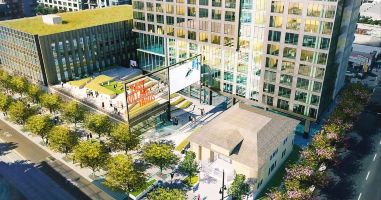 8. We broke ground on the four-story, 66,000-square-foot downtown center in August 2017 when downtown business was booming and the demand for space was high. This year, UC San Diego officially took possession of the building managed by UC San Diego Extension, which continues its history of groundbreaking impact through an array of educational programs, impactful initiatives and civic engagement.
8. We broke ground on the four-story, 66,000-square-foot downtown center in August 2017 when downtown business was booming and the demand for space was high. This year, UC San Diego officially took possession of the building managed by UC San Diego Extension, which continues its history of groundbreaking impact through an array of educational programs, impactful initiatives and civic engagement.
9. An effort led by UCSD Extension's ECO team resulted in a three-year, $1.6 million gift from philanthropist Buzz Woolley to support an innovative partnership with the Jacobs School of Engineering for teacher education in the fundamentals of engineering for public school teachers. The effort is meant to encourage more students of all backgrounds to enter science fields with greater success.
10. The U.S. Department of Labor's Occupational Safety and Health Administration (OSHA) awarded more than $11 million in Susan Harwood Training Grants to 90 organizations nationwide. Extension's OSHA program received $160,000 to provide fall prevention and protection training for 340 employers and workers in the construction, maritime and general industries. The targeted audience includes temporary, hard-to-reach, and underrepresented workers.
11. Extension presented a program on the "The Central Park Five" opera by prominent UC San Diego music professor and composer Anthony Davis at the San Diego Public Library a few months before being awarded the 2020 Pulitzer Prize in Music.
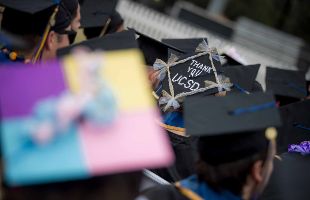 12. Over the last decade, more than 50,000 former University of California undergraduates never completed their degree, and current estimates are that 3.5 million adults in the state didn't complete a college degree. The University of California Office of the President awarded $200,000 to Extension's Center for Research and Evaluation to analyze the size and attributes of California citizens in this category who might potentially be interested in completing their degrees. It's part of an elaborate $15 million grant.
12. Over the last decade, more than 50,000 former University of California undergraduates never completed their degree, and current estimates are that 3.5 million adults in the state didn't complete a college degree. The University of California Office of the President awarded $200,000 to Extension's Center for Research and Evaluation to analyze the size and attributes of California citizens in this category who might potentially be interested in completing their degrees. It's part of an elaborate $15 million grant.
13. The Osher Lifelong Learning Institute for adults 55 and over pivoted quickly and provided an invaluable resource to members who could no longer indulge in the face-to-face instructor provided to an engaged learning community of retirees. The program shifted to online learning, created the option of digital-only memberships and provided free access to select online lectures and events while retaining their successful membership model.
14. Based on the changing landscape of work and an expansion of online business, our new Communication Design Certificate program led by MaeLin Levine, a professional with over thirty years of experience in the business of design, owning and operating a visual design firm, was able to address a burgeoning work-from-home profession. The certificate explores a new field of art, graphic design, print and digital media.
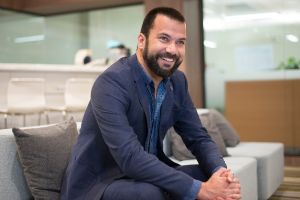 15. A Specialized Certificated in Digital Health was created with the guidance of Ramin Rafiei, a physicist, senior digital healthcare executive, healthcare visionary, instructor and program advisor for UC San Diego Extension's Department of Healthcare Research and Policy. The certificate was designed to appeal to entrepreneurs and entrepreneurial thinkers in remote healthcare, which has become a vital service in the times of COVID-19.
15. A Specialized Certificated in Digital Health was created with the guidance of Ramin Rafiei, a physicist, senior digital healthcare executive, healthcare visionary, instructor and program advisor for UC San Diego Extension's Department of Healthcare Research and Policy. The certificate was designed to appeal to entrepreneurs and entrepreneurial thinkers in remote healthcare, which has become a vital service in the times of COVID-19.
16. UC San Diego Researchers, including Josh Shapiro, Extension's Assistant Dean of Innovation and Research Affairs, received a $2.6 million National Science Foundation grant to develop and assess training for autistic adults interested in tech employment opportunities.
17. Our Paralegal Certificate program celebrated its 30th Anniversary as an American Bar Association-approved Paralegal Certificate program. A vital and rare distinction for a program that continues to innovate.
18. Awarded $6.1 million of a $36 million award of New Market Tax Credits from the city to construct a Workforce Development Accelerator and Community Arts & Culture Innovation Center at UC San Diego's new downtown center. The center is run by UC San Diego Extension, but the accelerator will be managed by prominent community partners to benefit professionals and entrepreneurs within low-income communities in the region.
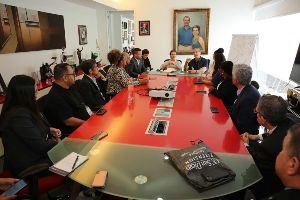 19. Extension's ECO team took a UC San Diego delegation, including local nonprofit, government and health officials, to Guanajuato, Mexico, to explore an educational exchange program with the former President of Mexico Vincente Fox, who now runs a youth leadership and education program with his wife.
19. Extension's ECO team took a UC San Diego delegation, including local nonprofit, government and health officials, to Guanajuato, Mexico, to explore an educational exchange program with the former President of Mexico Vincente Fox, who now runs a youth leadership and education program with his wife.
20. The Spanish for Healthcare Providers program provided a vital form of accessibility during the pandemic. Enrollments in the program increased among First Responders throughout California and even attracted international students. Typically patients bring a family member into appointments to translate from them, but that wasn't possible, so courses were filled with doctors and nurses who said they were motivated by their work with COVID-19 patients. They mentioned how rewarding it was to say even a few words to put Spanish-speaking patients at ease or to be able to understand their pain level for more efficient treatment.